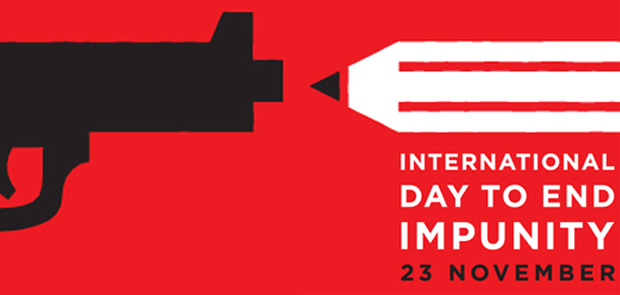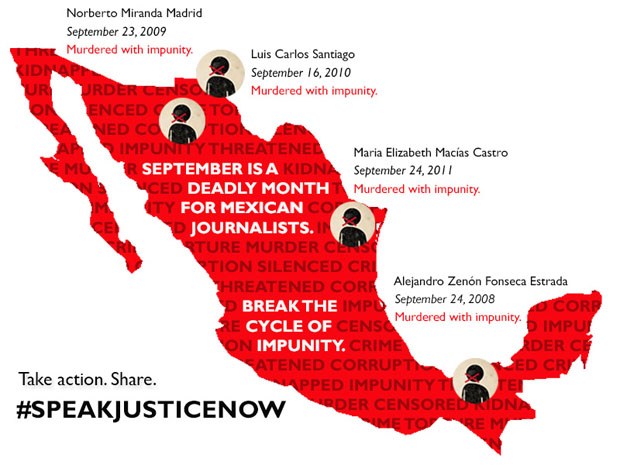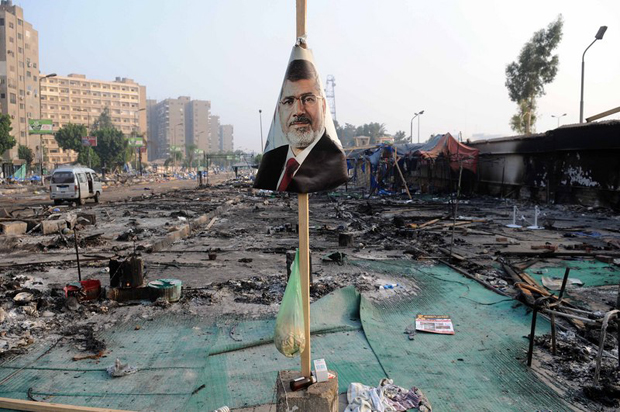22 Nov 2013 | Americas, Asia and Pacific, Azerbaijan News, Europe and Central Asia, News and features

Tomorrow is International Day To End Impunity. “When someone acts with impunity, it means that their actions have no consequences” explains IFEX, the global freedom of expression network behind the campaign. Since 1992, 600 journalists have been killed with impunity — that is 600 lives taken with all or some of those culpable not being being held responsible. Countless others — writers, activists, musicians — have joined their ranks, simply for exercising their right to freedom of expression.
This year has only added to the grim statistics. By the middle of January, six journalists had already been murdered. We are now getting close to the end of 2013, and 73 more journalists and two media workers have suffered the same fate — 48 in cases directly connected to their work, 25 with motives still unconfirmed. Out of these, 15 were killed without anyone — perpetrators or masterminds — convicted.
Russia is notorious for its culture of impunity. In July this year, Akhmednabi Akhmednabiev, a Russian journalist reporting on human rights violations in the Caucasus, was shot dead. In 2009 he had been placed on an “execution list” on leaflets distributed anonymously, and had in the past also received death threats. In January he survived an assassination attempt which local authorities reportedly refused to investigate. His case is still classed as murder with impunity.
Pakistan is also an increasingly dangerous place to work as a journalist. Twenty seven of the 28 journalists killed in the past 11 years in connection with their work have been killed with impunity. In the last year alone, seven journalists have been murdered. Express Tribune journalist Rana Tanveer told Index he has received death threats and been followed for reporting on minority issues. In October, Karak Times journalists Ayub Khattak was gunned down after filing a report on the drugs trade.
In July, Honduran TV commentator Aníbal Barrow was kidnapped together with his family and a driver. The others were released, but after two weeks, Barrow’s body was found floating in a lagoon. He was the second journalists with links to the country’s president Porfirio Lobo Sosa — they were close friends — to have been killed over the past two years. Four members of the criminal group “Gordo” were detained in connection with the case, but at one point, there were at least three other suspects on the run.
In September, Colombian lawyer and radio host Édison Alberto Molina was shot four times while riding on his motorcycle with his wife. His show “Consultorio Jurídico” (The Law Office), aired on community radio station Puerto Berrío Stereo, and often took on the topic of corruption. The Inter American Press Association in October called on authorities to open “a prompt investigation into the murders” of him and news vendor and occasional stringer José Darío Arenas, who was also killed in September.
Meanwhile in Mexico, a country for many synonymous with impunity for crimes against the media, three journalists were murdered in 2013. The state public prosecutor’s offices has yet to announce any progress in the cases of Daniel Martínez Bazaldúa, Mario Ricardo Chávez Jorge and Alberto López Bello, or disclose whether they are linked to their work. Notorious criminal syndicate Zetas took responsibility for the murder of Martínez Bazaldúa and warned the police about investigating the case. He was a society photographer and student, only 22 at the time of his death. Chavez Jorge, founder of an online newspaper, disappeared in May and his body was found in June, but in August the state attorney’s office said they did not have a record of his death. López Bello was a crime reporter who had published stories on the drugs trade.
This year, 20 journalists — from Naji Asaad in January to Nour al-Din Al-Hafiri in September — have also lost their lives covering the ongoing tragedy of the Syrian civil war. Their loved ones, like those of all the civilians killed, will have to wait for justice.
It is also worth noting that while an unresolved or uninvestigated murder is the most serious and devastating manifestation of impunity, it is not the only one. Across the world, journalists are being attacked and intimidated without consequences. In August there was a two-hour long raid on the home of Sri Lankan editor and columnist Mandana Ismail Abeywickrema, who recently started a journalists’ trade union. Despite her receiving threats related to her work prior to the attack, it was labelled a robbery by the police. Bahraini citizen journalist Mohamed Hassan experienced similar incident, also in August, when he was arrested and his equipment seized during a night-time raid. His lawyer Abdul Aziz Mosa was also detained and his computer confiscated, after tweeting about his client being beaten. In October, a group of Azerbaijani journalists were attacked by a pro-government mob while covering an opposition rally in the town of Sabirabad. One of the journalists, Ramin Deko, told Index of regular threats and intimidation.
International Day To End Impunity is a time to reflect on these staggering figures and the tragic stories behind them. More importantly, however, it represents an opportunity to stand up and demand action. Demand that Russia’s President Vladimir Putin, Mexico’s President Enrique Peña Nieto, Pakistan’s President Mamnoon Hussain and the rest of the world’s leaders provide justice for those murdered. Demand an end to the culture of impunity in which journalists, writers, activists, lawyers, musicians and others can be intimidated, attacked and killed simply for daring to speak truth to power. Visit the campaign website to see how you can take action.
24 Sep 2013 | Americas, Mexico, News and features
 This September marks the anniversary of the murders of four Mexican journalists. Alejandro Zenón Fonseca Estrada, Norberto Miranda Madrid, Luis Carlos Santiago and Maria Elizabeth Macías Castro were each killed within a year of each other, from 2008 to 2011. They were all covering drug cartels and corruption, and not a single person has been brought to justice in these murder cases.
This September marks the anniversary of the murders of four Mexican journalists. Alejandro Zenón Fonseca Estrada, Norberto Miranda Madrid, Luis Carlos Santiago and Maria Elizabeth Macías Castro were each killed within a year of each other, from 2008 to 2011. They were all covering drug cartels and corruption, and not a single person has been brought to justice in these murder cases.
Alejandro Zenón Fonseca Estrada, 33, host of a popular morning call-in show called “El Padrino Fonseca” (The Godfather Fonseca) was gunned down on September 24, 2008, by unidentified men as he was hanging up anti-violence posters.
Norberto Miranda Madrid, 44, was a Web columnist and host for the online station Radio Visión. He was shot multiple times by two masked gunmen in the offices of the radio station on September 23, 2009.
Luis Carlos Santiago worked as a photographer with the local daily El Diario. On September 16, 2010, he was shot and killed by unidentified gunmen. He was 21.
Maria Elizabeth Macías Castro, 39, tweeted about activities of criminal groups and covered the topic on the website Nuevo Laredo en vivo (Nuevo Laredo Live) using the pen name “La NenaDLaredo” (The girl from Laredo). On September 24, 2011, her decapitated body was found with a note that identified the website and her pseudonym.
Speak Justice Now is a campaign against impunity by the Committee to Protect Journalists. We encourage you to join thousands around the world to tweet Mexican President Enrique Peña Nieto today demanding an end to impunity using the hashtag #SpeakJusticeNow.
22 Aug 2013 | Egypt, News and features, Politics and Society

Egypt faced a new phase of uncertainty after the bloodiest day since its Arab Spring began, with nearly 300 people reported killed and thousands injured as police smashed two protest camps of supporters of the deposed Islamist president. (Photo: Nameer Galal / Demotix)
Nearly 1,000 people have been killed in Egypt in a week of deadly violence that began with a brutal security crackdown on Islamist protesters staging two sit ins in Cairo to demand the reinstatement of the country’s first democratically-elected president Mohamed Morsi . Six weeks earlier, Morsi had been removed from office by the military after millions of Egyptians took to the streets calling on him to step down and hold early presidential elections. Ever since the military takeover, hundreds of Muslim Brotherhood supporters have been killed or arrested as the Egyptian military and police pursue what they describe as an “anti- terrorism drive”.
The majority of Egyptians have expressed their support for the military and police , cheering them on in their sweeping campaign “to rid the country of the scourge of terrorism” and at times, launching verbal and physical attacks on the pro-Morsi protesters. Islamist supporters of the deposed president have meanwhile continued to stage rallies across the country, condemning the violence.
Egyptian media has also chosen to side with the country’s powerful security apparatus and has consistently glorified the military while demonizing the toppled president’s supporters. The text “Together against terrorism” appears on the bottom corner of the screen on most state and independent TV channels. In this bitterly polarized and often dangerous environment, it is the journalists covering the unrest that are caught in the middle, facing detention, intimidation, assault and sometimes, even death.
Tamer Abdel Raouf, an Egyptian journalist who worked for the state sponsored Al Ahram newspaper last week became the fifth journalist to die in the unrest when he was shot by soldiers at a military checkpoint “for failing to observe the nighttime curfew.” Abdel Raouf had been driving in Al Beheira when he was ordered by soldiers to turn back. While the soldiers claim he did not heed the warnings , another journalist accompanying him in the car said that Abdel Raouf had in fact been making a U turn when the soldiers fired their guns , instantly killing him. Prior to his death, he had persistently criticized the manner in which “the legitimate” president was ousted.
Other Egyptian journalists critical of the coup have meanwhile, faced intimidation and threats. The handful of Egyptian journalists who have remained unbiased, refusing to take sides in the conflict, have faced the wrath of an increasingly intolerant public that has labelled them “traitors” and “foreign agents.” A reporter working for an international news network who chooses to remain anonymous, told Index she had received threats via her Facebook account urging her to “remain quiet or be silenced forever.” The messages were sent by people claiming affiliations with Egypt’s security apparatus including the Egyptian intelligence , she said. “You will be made to pay for your stance,” read one message while another warned she would be physically attacked for being “a traitor and an enemy of the state.”
However, it is Western journalists that are bearing the brunt of the mounting anger in the deeply divided nation. The government has accused them of “being biased” in favor of the Islamists and of failing to “understand the full picture”.
“Some Western media coverage ignores shedding light on violent and terror acts that are perpetrated by the Muslim Brotherhood in the form of intimidation operations and terrorizing citizens,” a statement released by the State Information Service (SIS), the official foreign press coordination center said. SIS officials have also affirmed that no ‘coverage authorizations’ would be granted to foreign journalists unless they receive prior approval from Egyptian intelligence –a marked shift meant to restrict coverage to “journalists who have not ruffled the feathers of the authorities,” an SIS official who does not wish to be named, disclosed.
Meanwhile, in recent meetings with representatives of foreign media outlets, Foreign Minister Nabil Fahmy and presidential spokesman Ahmed Mosslemany have accused the Western press of conveying a “distorted image” of the events in Egypt. They urged the journalists to rein in their criticism of the government and to try and “see the full picture”. “Why is the Western media not covering the ‘terror’ acts committed by the Muslim Brotherhood including attacks on churches and police stations instead of devoting their coverage to assaults by security forces on pro-Morsi protesters?” they quizzed.
Western journalists deny that their coverage has been one-sided insisting that they had travelled to southern provinces where sectarian violence is rampant. Several foreign reporters have meanwhile, been subjected to harassment, assaults and detentions by security forces and popular vigilante groups while covering the recent clashes between pro-Morsi protesters and security forces.
Last Saturday marked a day of increased violence against Western journalists with at least six foreign correspondents reporting harassment and assaults while attempting to cover the siege on a mosque in downtown Cairo where pro_Morsi protesters had sought refuge after clashes with security forces. Two foreign journalists –the Wall Street Journal’s Matt Bradley and Alastair Beach, a correspondent with the Independent –sustained minor injuries when they were attacked by assailants outside the mosque but army soldier momentarily intervened, shielding them from the angry mob and dragging them to safety. Patrick Kingsley, a correspondent for the Guardian, was meanwhile, briefly detained and questioned by several suspicious vigilante groups and by police as he attempted to cover the mosque siege on Saturday. He later complained on Twitter that his equipment –including a laptop and cell phone– was seized in the process.
Abdulla Al Shami, a correspondent with Al Jazeera who was detained on Wednesday 14 August while covering the security crackdown on the Rab’aa pro-Morsi sit in, remains in police custody at an undisclosed location, according to the New York-based Committee for the Protection of Journalists. Mohamed Badr, a photographer working for the news channel has meanwhile been in detention since July 15 on the charge of possessing weapons—an accusation denied by Al Jazeera. Moreover, the offices of Al Jazeera Arabic were ransacked and shut down by police last week . Egyptian authorities are considering suspending Al Jazeera Mubasher’s license, accusing the network of “a clear pro-Morsi bias ” according to state owned Al Ahram newspaper. Many Egyptians are also accusing Al Jazeera of “inciting violence “ and of “threatening national security.”
The stepped up attacks on foreign journalists come at a time when the new interim government faces a chorus of international condemnation over its handling of the current political crisis. Clearly determined to crush the Muslim Brotherhood , the authorities remain defiant rejecting all attempts at reconciliation with the Islamists as “meddling in the country’s internal affairs.” Anyone remotely suggesting that the military should reconcile with the Muslim Brotherhood, the long detested arch-enemy, is accused of being a “traitor” and a “threat to the nation’s security”. Hence, the legal complaints recently filed against Vice President for Foreign Affairs Mohamed El Baradei who resigned his post earlier this month after security forces forcibly broke up the pro_Morsi sit ins.
In the divided country, Egyptians have adopted an uncompromising attitude of “you are either with us or against us”. The government has meanwhile encouraged such attitude by praising and rewarding “the patriots”. In such an atmosphere, there is no room for objectivity and any neutral media that reports without bias is accused of being pro-Islamist and perceived as “the enemy”.
Reverting back to Mubarak-era tactics, the government is determined to silence the voices of dissent.
2 Jul 2013 | Volume 42.02 Summer 2013
The current issue of Index on Censorship magazine features a special report on the shifting world power balance and the implications for freedom of expression.
“The multipolar world can be one where universal human rights and freedom of expression are kept firmly on the agenda, and increasingly respected, if these democracies hold themselves and each other to account — and are held to account — at home and internationally,” write Index CEO Kirsty Hughes and London School of Economics professor Saul Estrin.
The issue also looks at press freedom in Italy, Burma, Mexico, Columbia and India as well as violence against journalists and arrests of those who expose uncomfortable truths. “Worldwide, on average only one in ten cases of murders of journalists ends in a conviction,” says Guy Berger, author of an article on the threats and dangers journalists encounter around the world. Instead of being reassured that the rule of law will be upheld, “the take-away lesson for everyone is: journalists can be killed with impunity”.
From the current issue
Global view: Who has freedom of expression? | The multipolar challenge to free expression | Censorship: The problem child of Burma’s dictatorship | News in monochrome: Journalism in India
Also in this issue:
- John Lloyd on how party politics have skewed Italian journalism
- Yavuz Baydar says Turkey’s media moguls must defend free speech
- Htoo Lwin Myo tells what was it is like to work as a writer in Burma
- Bharat Bhushan on “paid-for” news and the absence of marginal voices in the Indian media
- Lawrence Freedman and Benedict Wilkinson on the opportunities — and limits — of online activism
- A new play from Turkmenistani writer-in-exile Farid Tukhbatullin, whose wit offers a glimpse of life inside one of the world’s most closed and repressive countries.
- Find out more here | Subscribe now
Did you know you can read the magazine on your iPhone/iPad? Download for FREE then upgrade to a 30 day subscription for only £1.79.



